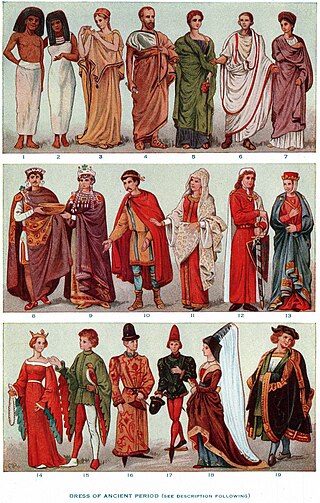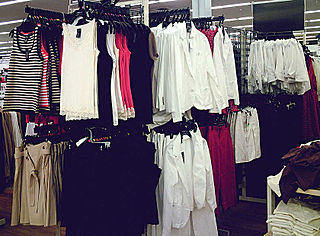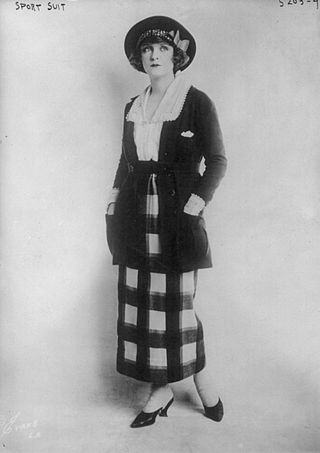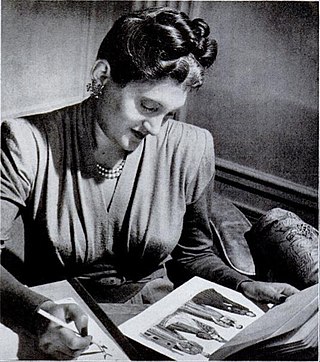
Clothing is any item worn on the body. Typically, clothing is made of fabrics or textiles, but over time it has included garments made from animal skin and other thin sheets of materials and natural products found in the environment, put together. The wearing of clothing is mostly restricted to human beings and is a feature of all human societies. The amount and type of clothing worn depends on gender, body type, social factors, and geographic considerations. Garments cover the body, footwear covers the feet, gloves cover the hands, while hats and headgear cover the head, and underwear covers the private parts.

Donna Karan, also known as DK, is an American fashion designer and the creator of the Donna Karan New York and DKNY clothing labels.

Ready-to-wear (RTW) – also called prêt-à-porter, or off-the-rack or off-the-peg in casual use – is the term for garments sold in finished condition in standardized sizes, as distinct from made-to-measure or bespoke clothing tailored to a particular person's frame. In other words, it is a piece of clothing that was mass produced in different sizes and sold that way instead of it being designed and sewn for one person. The term off-the-peg is sometimes used for items other than clothing, such as handbags. It is the opposite of haute couture.

A tube top, colloquially known in the UK as a boob tube, is a shoulderless, sleeveless garment primarily worn by women that wraps around the upper torso. It is generally tight over the breasts, and usually uses elastic bands at its top and bottom to prevent it from falling. The tube top's precursor was a beachwear or informal summer garment worn by young girls in the 1950s that became more widely popular in the 1970s and returned to popularity in the 1990s and 2000s.

The Garment District, also known as the Garment Center, the Fashion District, or the Fashion Center, is a neighborhood located in the borough of Manhattan in New York City. Historically known for its role in the production and manufacturing of clothing, the neighborhood derives its name from its dense concentration of fashion-related uses. The neighborhood, less than 1 square mile, is generally considered to lie between Fifth Avenue and Ninth Avenue, from 34th to 42nd Streets.

The Warnaco Group, Inc. was an American textile/clothing corporation which designed, sourced, marketed, licensed, and distributed a wide range of underwear, sportswear, and swimwear worldwide. Its products were sold under several brand names including Calvin Klein, Speedo, Chaps, Warner's, and Olga.
Olivier Theyskens is a Belgian fashion designer who has worked with major design houses, including Rochas, Nina Ricci and Theory.

Designer clothing refers to apparel created by a specific fashion designer or licensed by a person or brand. It is often considered luxury clothing, known for its high quality and haute couture appeal, made for the general public and bearing the label of a renowned designer. Licensing designer names has been a common practice within the fashion industry since the 1970s. Designer clothing includes a wide range of apparel, such as designer jeans, which can often cost several hundred dollars.

Fast fashion is the business model of replicating recent catwalk trends and high-fashion designs, mass-producing them at a low cost, and bringing them to retail quickly while demand is at its highest. The term fast fashion is also used generically to describe the products of this business model, particularly clothing and footwear. Retailers who employ the fast fashion strategy include Primark, H&M, Shein, and Zara, all of which have become large multinationals by driving high turnover of inexpensive seasonal and trendy clothing that appeals to fashion-conscious consumers.
Anne Klein was an American fashion designer, businesswoman, as well as a founder and the namesake of Anne Klein & Company.
Rochas is a fashion, beauty, and perfume house founded in 1925 by French designer Marcel Rochas, the first designer of 2/3-length coats and skirts with pockets and one of the two designers, along with Elsa Schiaparelli, who launched the fashion for padded shoulders in 1931. Rochas had been known primarily for its signature perfume, "Femme," which was packaged in a pink box with black lace.

Fashion design is the art of applying design, aesthetics, clothing construction and natural beauty to clothing and its accessories. It is influenced by culture and different trends and has varied over time and place. "A fashion designer creates clothing, including dresses, suits, pants, and skirts, and accessories like shoes and handbags, for consumers. He or she can specialize in clothing, accessory, or jewelry design, or may work in more than one of these areas."

Elie Tahari is an Israeli fashion designer. He is the designer of ready-to-wear clothing and fashion accessories. His company is headquartered in New York City, with stores located throughout the world.
Theory is a New York City–based men's and women's contemporary fashion label which sells clothes and accessories. The brand has 434 retail locations, and global sales approaching $1 billion as of 2021. The company's headquarters and flagship boutique are located in Manhattan's Meatpacking District.

Sportswear is an American fashion term originally used to describe separates, but which since the 1930s has come to be applied to day and evening fashions of varying degrees of formality that demonstrate a specific relaxed approach to their design, while remaining appropriate for a wide range of social occasions. The term is not necessarily synonymous with activewear, clothing designed specifically for participants in sporting pursuits. Although sports clothing was available from European haute couture houses and "sporty" garments were increasingly worn as everyday or informal wear, the early American sportswear designers were associated with ready-to-wear manufacturers. While most fashions in America in the early 20th century were directly copied from, or influenced heavily by Paris, American sportswear became a home-grown exception to this rule, and could be described as the American Look. Sportswear was designed to be easy to look after, with accessible fastenings that enabled a modern emancipated woman to dress herself without a maid's assistance.

Nettie Rosenstein was an American fashion designer, based in New York City between c.1913 and 1975. She was particularly renowned for her little black dresses and costume jewelry.
Tommy Hilfiger B.V., formerly known as Tommy Hilfiger Corporation and Tommy Hilfiger Inc., is a Dutch-based American clothing brand that manufactures apparel and licensed products such as footwear, accessories, fragrances and home furnishings. The company was founded in 1985, and its merchandise is sold in department stores and over 2000 free-standing retail stores in 100 countries.

Stacey Bendet Eisner is an American fashion designer who is founder and CEO of the clothing company Alice + Olivia.

Israeli fashion refers to fashion design and modeling in Israel.

Clothing industry or garment industry summarizes the types of trade and industry along the production and value chain of clothing and garments, starting with the textile industry, embellishment using embroidery, via the fashion industry to apparel retailers up to trade with second-hand clothes and textile recycling. The producing sectors build upon a wealth of clothing technology some of which, like the loom, the cotton gin, and the sewing machine heralded industrialization not only of the previous textile manufacturing practices. Clothing industries are also known as allied industries, fashion industries, garment industries, or soft goods industries.














